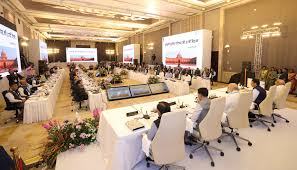Western Zonal Council Convenes for Regional Progress in Pune
Current Affairs NationalPosted by newadmin on 2025-02-25 09:07:47 |
Share: Facebook | Twitter | Whatsapp | Linkedin Visits: 20

Union Home Minister Amit Shah recently led the 27th Western Zonal Council meeting in Pune, Maharashtra. The gathering brought together the Chief Ministers of Maharashtra, Gujarat, and Goa, alongside the Administrator of Dadra and Nagar Haveli and Daman and Diu, as well as senior officials from various state and central ministries. Zonal Councils play a crucial role in fostering cooperative federalism in India by facilitating dialogue between states, addressing common concerns, and promoting regional collaboration.
The idea of Zonal Councils was first proposed by Jawaharlal Nehru in 1956, aiming to mitigate linguistic conflicts after the reorganisation of states. This initiative, formalised through the States Reorganisation Act of 1956, led to the creation of five Zonal Councils, each composed of specific states and union territories grouped by geographic regions. In addition to the five original councils, the North Eastern Council was established in 1972 to include states like Assam, Arunachal Pradesh, Manipur, Tripura, Mizoram, Meghalaya, and Nagaland.
Each Zonal Council is chaired by the Union Home Minister and has a rotating Vice-Chairman, usually a Chief Minister from a member state, serving for one year. Alongside them, ministers from member states, union territory representatives, and officials from the Planning Commission participate in discussions. These councils are responsible for resolving disputes between the Centre and states or among states themselves, covering issues such as economic planning, social welfare, border disputes, and transportation. Over time, the councils have evolved from advisory bodies to more action-oriented platforms, particularly under the leadership of the Modi government.
In terms of growth, the frequency and productivity of Zonal Council meetings have significantly increased. Between 2014 and 2025, meetings rose by 140%, with a total of 61 compared to 25 between 2004 and 2014. The number of topics discussed also surged by 170%, while the number of resolved issues tripled, indicating a heightened focus on achieving 100% completion of agenda targets.
The Western Zonal Council holds significant economic importance as it contributes 25% of India’s GDP, accounts for 80-90% of industrial activities, and handles over half of India’s global trade. This region also supports international commerce for northern and central states through its well-developed infrastructure, including ports and urban development initiatives.
Key issues addressed during the recent meeting included financial inclusion, where nearly all villages now have banking facilities within five kilometers. There is a new goal to reduce this distance to three kilometers, enhancing accessibility for rural populations. Despite the region’s prosperity, malnutrition and public health remain pressing concerns. States were urged to take decisive action to eradicate malnutrition, promote preventive healthcare, and reduce school dropout rates while improving education quality.
Another focal point was boosting domestic pulse production by reducing imports and ensuring fair prices for farmers. A new mobile application has been introduced to enable farmers to sell their produce directly at the Minimum Support Price (MSP), with states encouraged to promote the app and facilitate farmer registrations.
The meeting also covered various state-specific and national issues such as land transfers, mining activities, the fast-tracking of rape case investigations under the FTSC scheme, railway projects, food safety, urban planning, affordable housing, electricity supply, and participation in the Ayushman Bharat hospital initiative. Best practices, such as Gujarat’s automated supply chain for the public distribution system, were shared to inspire improvements across regions.
In conclusion, the states committed to acting promptly on the meeting’s suggestions, reinforcing the importance of cooperative federalism and striving for complete saturation of welfare schemes. The Zonal Councils continue to play a pivotal role in strengthening India’s federal structure, fostering collaboration and unity among diverse linguistic and cultural groups while promoting balanced socio-economic development across the country.
Search
Categories
Recent News
- Hyderabad's Traffic Wings Get a Boost with IPS Officer Reshuffle
- Uncovering the Golden Scheme: I-T Raids Expose Bullion Trading Secrets
- Big Tech's Child Safety Crisis: Australia Sounds the Alarm
- Blue Cloud Softech's $150M Edge AI Chip Venture
- Nuclear Diplomacy Revived: US and Iran Resume Talks
- Curiosity Illuminates Mars: Unveiling the Red Planet's Night Secrets
- Telangana's Cybercrime Conclave: AI Takes Centre Stage
- SEIL's Rs 20 Crore Hospital Project: A Milestone for Rural Healthcare
Popular News
- Navigating IPO Market Dynamics Amid Volatility and Regulatory Changes
- Massive Worldwide Microsoft Outage Disrupts Multiple Sectors
- Panjapur Bus Stand to Reshape TNSTC Routes
- తెలుగుదేశం పార్టీ - పేదరికాన్ని నిర్మూలించడంలో వాగ్దానం
- Universities Embrace Remote Learning Technologies Amidst Ongoing Pandemic